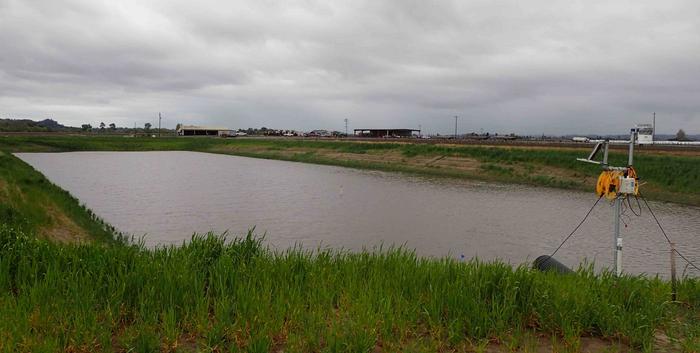Many aquifers in California and around the world are being drained of their groundwater because of the combined impacts of excess pumping, shifts in land use, and climate change. However, a new study by scientists at UC Santa Cruz and UC Berkeley, published on Oct. 18 in Nature Water, may offer a solution. It describes the development and operation of a novel incentive program that uses water rebates to pay for some of the costs of getting stormwater runoff into the ground. The program is called recharge net metering (ReNeM).

Credit: Photo courtesy of Andrew Fisher
Many aquifers in California and around the world are being drained of their groundwater because of the combined impacts of excess pumping, shifts in land use, and climate change. However, a new study by scientists at UC Santa Cruz and UC Berkeley, published on Oct. 18 in Nature Water, may offer a solution. It describes the development and operation of a novel incentive program that uses water rebates to pay for some of the costs of getting stormwater runoff into the ground. The program is called recharge net metering (ReNeM).
Although California satisfies about 40% of freshwater demand with groundwater during “normal years,” many parts of the state are highly or entirely reliant on groundwater, especially during droughts. The Central Coast hydrologic region, extending from Santa Cruz to Santa Barbara, is especially dependent on groundwater, lacking significant snowpack that generates spring flows, does not have major rivers or reservoirs behind dams, and is not significantly involved in intrastate water transfers. California’s Sustainable Groundwater Management Act (SGMA) requires more than 100 groundwater basins around the state to bring their aquifers into balance by 2040. It has proven challenging to get more water into the ground when available. More urbanization leads to more rainfall running off the landscape, as do more intense storms.
“ReNeM helps to incentivize projects and participants to collect stormwater runoff generated during big winter rain events and percolate that water into aquifers,” said Molly Bruce, lead author of the new paper and a Water Fellow at UC Berkeley’s Center for Law, Energy, & the Environment (CLEE). “This approach can help agencies to meet SGMA requirements. It is a similar approach to what the power industry has done with solar panels and ‘net energy metering,’ paying for excess electricity that is shared on the grid.”
ReNeM is a market-based incentive program developed by a team from UC Santa Cruz (UCSC) and the Resource Conservation District of Santa Cruz County (RCD) and implemented in collaboration with the Pajaro Valley Water Management Agency (PVW). UCSC and RCD personnel help to find good locations for ReNeM projects, get sites tested for suitability and raise funds for construction. They also monitor performance and report results to the water agency, which issues rebates based on the infiltration benefit created by each project each year.
“ReNeM recognizes that putting water into the ground provides system services,” said ReNeM co-developer and paper co-author Andrew Fisher, a professor at UC Santa Cruz. “Some of that water may be pumped out later and used for crops, and some of that water may flow elsewhere in the aquifer and support aquatic conditions in nearby streams. ReNeM recognizes these benefits, and this paper does a detailed assessment of how ReNeM compares to alternative ways to sustain water supplies.”
“Every basin and water agency has to make choices.” according to Michael Kiparsky, the director of CLEE’s Wheeler Water Center and co-author of the study. “This work adds up the costs and benefits of the ReNeM program, and the results show that in this region, these costs are competitive compared to alternative water supplies.”
The ReNeM program is highly adaptable and unique in many respects. It can work on public or private land, and it can generate benefits to water quality as well as water supply. Payments are made in the form of a rebate that offsets fees charged for pumping groundwater. Benefits from ReNeM can accrue to the groundwater basin overall, not just for those that recharge the water (in this way, ReNeM differs significantly from “water banking”). ReNeM is a distributed program that allows projects to be spread across a region, and different methods can be used to collect water and route it into an aquifer.
Funding in support of this work was provided by the Gordon & Betty Moore Foundation, the U.S. Environmental Protection Agency (EPA), the U.S. Department of Agriculture (USDA), and a recent implementation grant from UCSC’s Center for Coastal Climate Resilience.
Journal
Nature Water
DOI
10.1038/s44221-023-00141-1
Article Title
Recharge net metering (ReNeM) is a novel, cost-effective management strategy to incentivize groundwater recharge
Article Publication Date
18-Oct-2023




